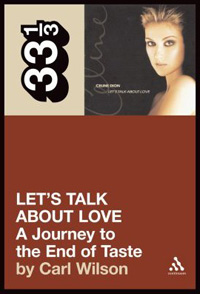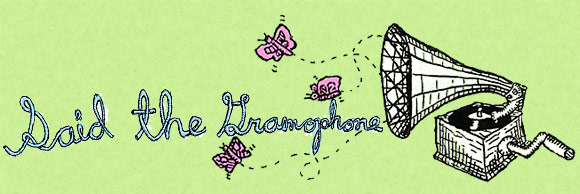
This is the third in a series of three posts celebrating and responding to Carl Wilson’s book, Let’s Talk About Love: A Journey to the End of Taste.
Carl’s installment in the 33 1/3 series of books on albums is, as Dan and Sean have both pointed out, a book about Celine Dion that is not about Celine Dion. Rather, it is a discursive work on, among other things, taste, identity, and the practice of music criticism. It’s also about the writer himself; in the middle of the book, as the personal begins to pervade its pages and its themes are reframed in this context, we discover that what at first appeared a worthy academic exercise is actually a stealthily affecting work. As Sean put it yesterday, it is “a treatise on aesthetics cut through (like a hot knife) with the deeply personal.”
In another way, however, Carl’s book actually really is about Celine Dion. Let’s Talk About Love is in fact a fine and compelling, if highly unusual, work of appreciation. Yes, it could have been about someone else, some other saccharine or schmaltzy artist, but it’s not. By the end of his year-long experiment, Carl can write earnestly, though somewhat tepidly, about a few merits of Dion’s music, and carefully – without patronizing and with sympathy – about her usefulness in the world, about what other people might like about her. And in so doing, I think he provides by example an answer to one of the central questions of his book: If there is no objectively good or bad taste, no hierarchy of low and high brows, what is the point of music criticism?
***
My eighth year was an important one in my aesthetic development. In 1988 I was impacted in particular by two events: 1) Ben Johnson was stripped of his Olympic Gold Medal in the 100 metre dash; 2) I bought my first two cassettes: Bob Dylan’s Greatest Hits, Volume Two and Joe Cocker’s Greatest Hits. Johnson’s disgrace brought me infinite sadness, my new tunes uncountably infinite joy. Thus was my intended career path diverted from track and field to the arts.
My parents were fans of Bob Dylan and Joe Cocker (one of whose songs is also “their song”), and I took pleasure in liking the same things as them, especially when “our taste” diverged, as it always did, from the standard taste of my peers. My aesthetic was determined at that age by wanting to be one of the cool kids, and my role models just happened to be Alex and Frum Himelfarb, Ph.Ds. This is not to say that I didn’t derive real pleasure from listening to the music – my first musical loves were among my most intense – just that it was not in a vacuum that I arrived at those particular artists. (For more on my musical education as provided by Dad, read this.)
By high school I’d added indie rock, proto-punk, post-punk, new wave, prog, jazz (and several of its sub-genres) to my early musical diet of classic rock and folk. I was constantly in search of the new - new sounds, new names. I hosted a show at Ottawa U’s radio station that might best have been called Something to Alienate Everyone. When I moved to Montreal for university, I became an obscene consumer of records, buying up everything I could get my grubby little paws on. I discovered soul and old blues and John Fahey – whatever he is – classical musics and country and everything else. I was so open-minded that my brains fell out; a list of the many and diverse purchases made during my Great Consumption would act as a reductio ad absurdum, negating the validity of my critical work, if such a thing were possible. My motivations for behaving this way were myriad: Yes, the accumulation of cultural capital was part of it; but – and I imagine this is true of almost all music collectors - I was also genuinely curious, genuinely loving of these new and different musics, an addict looking for my next fix.
There is no doubt that I taught myself to like much of this stuff. I was not born into my taste; rather, my preferences are the product of a subtle, ineffable interaction between nature, socialization and cultivation. What difference does it make how I arrived at them; I am glad for the discovery of every piece of music I now enjoy, for without any one my life would be less rich.
***
Now I’m an old hermit, it’s true. Whereas until recently my taste biography was one of constant addition, for the first time my musical preferences have narrowed and hardened. You might say that I now know what I like, or you might say that I’ve become lazy, less willing to learn to like. Either way, I can’t properly serve the traditional role of music critic. I’m not interested enough to sift through every new release, I don’t have the energy to write negatively about music that never had a chance with me or the conviction to convince someone that something they like isn’t good.
Several years ago, I wrote an article about the 33 1/3 series in which I talked about the “tremendous potential of music writing to go beyond the role of guide, of simple yay- or naysayer, to serve as a broadener of taste, an enricher of appreciation, and a window into the author’s own experience of music.” I argued that the most profound thing a critic can do is “point to something in a musical work - a harmony, a melody, a lyrical theme, a fact about its creation or creator, or even the critic’s own subjective experience of it - that makes the listener experience its beauty anew or with new depth.” None of this depends upon objective detachment or an acknowledgement of high and low, just a belief in the possibility of the intersubjective appreciation of art. I hope that is what we do here at Said the Gramophone. Certainly Carl’s book does it in spades; by calling out our flimsy aesthetic prejudices, he encourages a more generous approach to art as well as to people with taste different from our own.
[Buy Bob Dylan, Joe Cocker, and please buy Carl Wilson's Let's Talk About Love]
Posted by Jordan at January 9, 2008 9:13 PM



